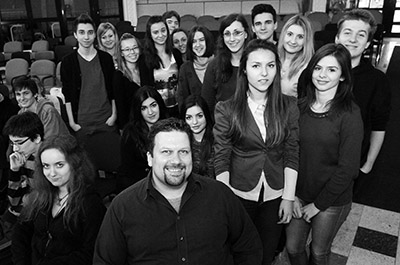
Miljenko Hajdarovic
Former Auschwitz: The Past is Present teacher Miljenko Hajdarovic announced that he has been chosen to join 300 other educators to completely reform the Croatian national curriculum.
Hajdarovic teaches history, sociology, politics and civics at Cakovec High School in northern Croatia. He was one of 25 educators chosen to attend the Auschwitz: The Past is Present professional development program led by USC Shoah Foundation and Discovery Education to commemorate the 70th anniversary of the liberation of Auschwitz.
The Croatian reform aims to provide students with “education in line with their ages and interests to prepare them for the world of work, further education and modern life,” according to a press release. The reform will focus in part on linking education to the needs and interests of students and also to the needs of society and the economy. Teachers will also be more autonomous, creative and not so beholden to bureaucracy and administration. There will also be more emphasis on professional development for teachers.
Hajdarovic, who has a master’s degree in history and sociology education and grew up learning about World War II, will be working on the history and politics curriculum with 11 other educators.
“My APiP experience will help me to be more powerful regarding the subject of Holocaust in curriculum,” he said.
When he teaches the Holocaust to his students, he emphasizes what the world lost because of the destruction of the European Jewish culture and its potential accomplishments. Hajdarovic said his students are usually very interested in World War II but know little about it. They are “stunned” to hear the stories of people who perished or survived.
“Then we try to connect with today and speak how we can react if some similar situations happened,” Hajdarovic said.
Prior to his trip to Poland, Hajdarovic said that his emotional response is very important in his teaching. When he shares his own emotions with his students, the lesson has a bigger impact on them.
“Holocaust is an example of how different steps of isolation, racism and hate can evolve and lead to extreme. And that’s the key point for my students – after learning about the Holocaust they can recognize and act when similar events occur in present time,” Hajdarovic said. “The best way to learn about the events is to listen and see the persons that survived the event.”